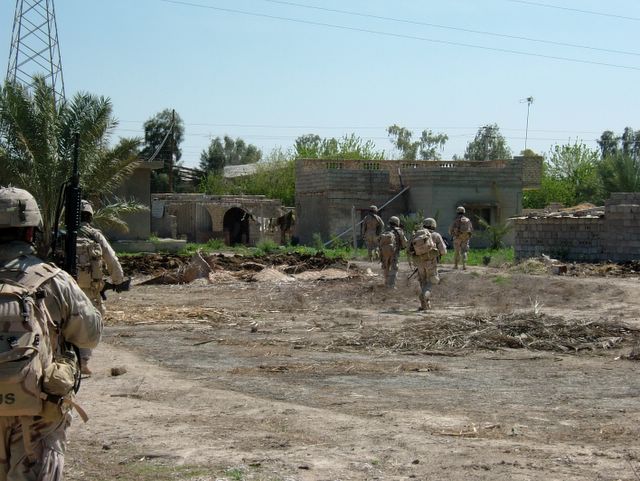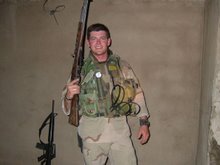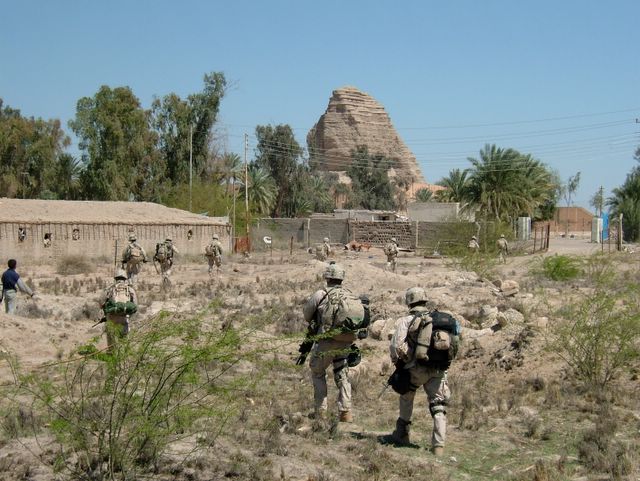Israel, Hezbollah Intensify Ground Conflict in Lebanon
By Scott Wilson and Edward Cody
Washington Post Foreign Service
Friday, July 21, 2006; A01
JERUSALEM, July 20 -- Israeli ground forces and Hezbollah guerrillas engaged in heavy fighting inside Lebanon on Thursday, as senior Israeli defense officials braced the country for a long conflict against the radical Islamic groups on its borders and indicated that a large ground operation could still lie ahead.
The Israeli military said at least two soldiers were killed and six others wounded in the fighting, the most intense ground exchange in the current military campaign. Israeli military officials later said two Apache attack helicopters collided at Ramot Naftali, about two miles inside the Israeli border, just after midnight. Israel's army radio said there were four casualties in the crash, Reuters news agency reported.
Israeli military aircraft pounded targets across Lebanon for a ninth straight day amid growing international calls for Israel to suspend a bombing campaign that has ravaged that country's civilian population. The airstrikes swelled the ranks of the displaced and accelerated the evacuation of U.S. citizens and other foreign nationals, thousands of whom sailed away from the tattered country in a chartered cruise ship and a military transport vessel.
Using local radio stations and other media, Israel warned the roughly 300,000 Lebanese civilians who live south of the Litani River, which runs about 25 miles north of Israel's border with Lebanon, to abandon their homes. Israeli officials, meanwhile, indicated that a large ground offensive could follow as rocket fire continued into Israel's Galilee region, although at a diminished rate.
During a tour of northern Israel, where more than 850 rockets have rained down since Hezbollah gunmen captured two Israeli soldiers in a cross-border raid on July 12, Defense Minister Amir Peretz said the radical Shiite Muslim militia "must not think that we would recoil from using all kinds of military measures against it."
"We have no intention of occupying Lebanon, but we also have no intention of retreating from any military measures needed," Peretz said. The comments left open the possibility that Israel could move forces into southern Lebanon, the restive, Shiite-dominated region it has occupied before. Israeli military officials have raised the need to clear Hezbollah forces from a 12-mile-wide swath inside the Lebanese border to increase the distance between the group's increasingly long-range arsenal and the Israeli cities in the firing line.
Israeli officials have dismissed international proposals for a peacekeeping force in southern Lebanon, saying they need more time to bombard Hezbollah launch sites, bunkers and supply routes before considering a cease-fire. They say the bombing effort has severely damaged Hezbollah forces -- an assertion denied by the group's leaders in Lebanon.
Hezbollah gunmen fired about 40 rockets into Israel, about a third of the number they fired the previous day. There were no casualties reported from Thursday's rocket strikes, which have killed 15 Israeli civilians since fighting began.
U.N. Secretary General Kofi Annan on Thursday urged Israel to halt its military operations in Lebanon, claiming it is inflicting unacceptable harm on civilians while increasing Hezbollah's popularity and undercutting Lebanon's fledgling democracy. But he voiced pessimism about the prospects for a quick halt to the violence and urged Israel to avoid civilian casualties in the meantime and provide access for humanitarian relief workers throughout Lebanon.
"The Lebanese people, who had hoped that their country's dark days were behind them, have been brutally dragged back into the war," Annan told the U.N. Security Council. He was accompanied by former Indian diplomat Vijay Nambiar, who had just returned from leading a peace mission in the region.
"Let me be frank with the council," Annan said. "The mission's assessment is that there are serious obstacles to reaching a cease-fire, or even diminishing the violence quickly."
Secretary of State Condoleezza Rice launched her diplomatic effort at a working dinner with Annan on Thursday, with a Security Council briefing scheduled for Friday morning. The United States is now working on a package of ideas for Rice to take the region when she begins talks early next week, with timing and locations still up in the air, U.S. officials said.
The fighting near the Lebanese village of Maroun al-Ras, just across the border from the Israeli farming community of Avivim, pointed up Hezbollah's skill at fighting in terrain it has spent years preparing against another Israeli invasion. Sixteen Israeli soldiers have been killed so far on the northern front, and 61 have been wounded.
Heavy fighting broke out several times throughout the day after Israeli tanks and bulldozers pushed a few hundred yards inside Lebanon in search of tunnels, bunkers and posts used by Hezbollah gunmen.
The clashes involved small-arms fire and antitank missiles. Israeli attack helicopters provided support as soldiers removed the wounded. Hezbollah's television station, al-Manar, said two Israeli tanks were destroyed in the clashes.
Lebanese officials say more than 300 Lebanese have died in the fighting, nearly all of them civilian, while more than 1,000 others have been wounded. It is unclear how many Hezbollah gunmen have died in the airstrikes or ground fighting.
In a statement, Hezbollah officials said bombing by Israel on Wednesday night that was described as an attack on a bunker in fact hit a mosque under construction and caused no injuries to senior Hezbollah leaders.
Hezbollah members of parliament, who number a dozen among the legislature's 128 members, appeared on Lebanese television to vow steadfastness and declare that the group's arsenal still has plenty of weapons for retaliatory strikes against Israeli towns. Hezbollah officials escorted journalists around their southern Beirut stronghold to show the damage to what they said were civilian residences.
Israeli aircraft roamed the southern Lebanese skies looking for targets, continuing their campaign to blast Hezbollah infrastructure and prevent vehicles from resupplying the militia's forces. But missile attacks seemed to diminish in the area around Beirut as foreign governments, including that of the United States, continued evacuation operations.
In the Gaza Strip, where Israeli tanks and troops clashed with gunmen from the governing Hamas movement's military wing, the death toll rose on Israel's second front. Palestinian hospital officials said four Palestinians were killed, including two children, as Israeli forces attacked Palestinian positions in the Mughazi refugee camp in central Gaza for a second day.
[On Friday, Israeli tanks and troops withdrew from the Mughazi camp, Reuters reported, citing witnesses and an Israeli army spokeswoman.
"Yes, our forces are out, but it is important to emphasize that operations in Gaza continue," Reuters quoted the spokeswoman as saying.]
Hamas's military wing helped stage the June 25 cross-border raid on an army post in which a 19-year-old Israeli soldier was captured. Its members also regularly fire rockets into southern Israel, something Israeli officials say must stop. Hospital officials put the two-day casualty toll at 11 dead and more than 170 wounded.
About 40 Marines came ashore in a Maronite Christian area in Lebanon just north of Beirut to help U.S. nationals board a landing craft and move to the USS Nashville, a warship looming offshore. The Ocean Queen, a cruise ship chartered by Washington, returned late in the day for a second load of Americans.
U.S. authorities in Beirut also used a bus convoy Thursday to evacuate 341 American citizens from battered southern Lebanon and moved approximately 2,250 people out of the country on helicopters and sea vessels, military and diplomatic officials said. The departures marked the largest group of U.S. citizens to leave Lebanon on a single day since Israeli airstrikes began.
Since Marine helicopters first began lifting people out of Beirut on Sunday, the United States has been able to transport more than 3,850 citizens to safety, said Maura Harty, assistant secretary of state for consular affairs.
The U.S. move to rescue those in the south, the most dangerous area of the country, was hailed by U.S. officials as "successful," but they also said there could be more people there they just don't yet know about. Harty said another evacuation from southern Lebanon was possible. She urged U.S. citizens trapped there to "continue to stand fast" and monitor Lebanese radio for updates.
Harty said the 341 citizens who were bused out of southern Lebanon were scheduled to board a cruise ship for Cyprus.
European and other governments also proceeded with evacuations of their nationals, most of them Lebanese with foreign passports who had returned for summer vacations. Officials estimated that more than 12,000 foreigners have been taken out of the country in the past three days.
The Israeli public, while so far largely supportive of Prime Minister Ehud Olmert's war effort, has been generally less tolerant of ground operations since Israel's 1982 invasion of Lebanon and the bloody 18-year occupation that followed. Israel left southern Lebanon in May 2000.
Amos Yaron, a retired general who commanded the paratroop division that entered Beirut in 1982, said that "people make a lot of mistakes when they are drawing lessons" from the Lebanon invasion.
"We didn't have any problem entering Lebanon in 1982," Yaron said. "The problem was leaving it."
Yaron said he believes a ground operation might be necessary before the fighting ends. "At the end of the day," he said, "you have to take Hezbollah out of southern Lebanon. No one will do it for you."
Yagil Levy, a professor of public policy at Ben Gurion University in Beersheba and author of the "The Other Army of Israel," said most of Israel's senior commanders served as young officers during the 1982 invasion and the Hezbollah attacks that followed during the occupation.
He said the leadership is suffering "schizophrenia" from the lessons it learned from that experience. On the one hand, he said, military commanders understand "never to get involved in a war of attrition" that turns the Israeli public against it.
"But the opposite element is that some of these people carry with them a lot of frustration," Levy said. "For some of these officers, this operation now is something like unfinished business."
Cody reported from Beirut. Staff writers Josh White and Robin Wright in Washington and Colum Lynch at the United Nations also contributed to this report.
© 2006 The Washington Post Company












